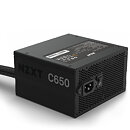- Joined
- Oct 9, 2007
- Messages
- 47,853 (7.38/day)
- Location
- Dublin, Ireland
| System Name | RBMK-1000 |
|---|---|
| Processor | AMD Ryzen 7 5700G |
| Motherboard | Gigabyte B550 AORUS Elite V2 |
| Cooling | DeepCool Gammax L240 V2 |
| Memory | 2x 16GB DDR4-3200 |
| Video Card(s) | Galax RTX 4070 Ti EX |
| Storage | Samsung 990 1TB |
| Display(s) | BenQ 1440p 60 Hz 27-inch |
| Case | Corsair Carbide 100R |
| Audio Device(s) | ASUS SupremeFX S1220A |
| Power Supply | Cooler Master MWE Gold 650W |
| Mouse | ASUS ROG Strix Impact |
| Keyboard | Gamdias Hermes E2 |
| Software | Windows 11 Pro |
The new C Series Bronze power supplies offer stable and safe power to all types of builds. The new lineup of Bronze PSUs generates less heat, keeping your system running quietly and efficiently. Their reliable components make up a unit that is backed by a 5-year warranty—the NZXT C Series Bronze PSUs are here to get your build powered up without letting you down.

View at TechPowerUp Main Site

- 80 Plus Bronze certified
- Semi-modular design and durable sleeved main cables
- Silent performance with reduced heat and fan RPM
- 5-year warranty
- Available in 550w, 650w, and 750w options.
- C550 Bronze: $79.99
- C650 Bronze: $89.99
- C750 Bronze: $99.99
View at TechPowerUp Main Site






